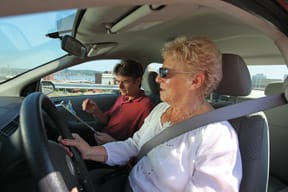Driving while cognitively impaired renders those 65 years of age and older 17 times more likely to have a fatal accident; and things are only going to get worse-much worse
I'm nudging 65. I canoe, hike, swim, do Tai Chi and consider myself relatively fit – yet I am acutely aware that I am no longer 20.
For example, memory plays tricks on me, I loathe night driving and my hips often feel as if they are full of shrapnel. Will there come a time in my life when I am no longer safe on the road? Yes, and that merits attention.
Transport Canada projects that casualty crashes involving drivers age 65 and older will increase by more than 200 per cent by 2026. That comes as no surprise: the percentage of seniors is on the rise (most particularly in Atlantic Canada) and most of us drive. But the common belief is that older drivers are mainly involved in "fender benders." Not true. Most accidents involving drivers 65-plus are multiple-vehicle crashes. For fatalities alone, the crash rate is 17 times greater than drivers who are 25 to 65 years of age.

Medication is one factor contributing to accidents. Ninety percent of people 65-plus use some form of medication at least once a week, and about 12 per cent take 10 kinds of medication or more. Studies show that certain medication classes such as narcotic analgesics, cyclic antidepressants and benzodiazepines are crash contributors.
But a decline in driving competence is not solely the realm of the aging. Some medical conditions alter a person's driving ability, regardless of age. "Cognitive impairments can result from a wide variety of conditions," says Dr. Allen Dobbs, cognitive psychologist, CEO and president of DriveABLE Assessment Centres Inc., headquartered in Edmonton. "Some are age-associated, but they are not caused by age. They are caused by illness or medical conditions."
The list of conditions he's referring to includes cardiovascular, neurological, respiratory, metabolic and renal diseases. Dementia and psychiatric illness can also put drivers at risk. Studies show, for example, that dementia can affect critical judgment and reaction time, like turning left into oncoming traffic or having slow response time at a critical moment. It can also affect colour recognition, a concern when navigating through traffic lights.
However, 17 per cent of persons beyond the age of 65 have cognitive impairment that is not due to dementia. It's due to a decline in mental abilities that affect attention, memory, judgment and decision-making. In a nutshell, a substantial number of people are cognitively impaired. This means that attention, memory judgment and decision-making are functioning at a level where it is not safe for them to drive. Unsurprizingly, drivers who are cognitively impaired have the greatest risk of an at-fault crash.
The good news is that Dr. Dobbs has created DriveABLE, a scientifically-based driver evaluation that measures cognitive functioning. It's a two-part procedure involving a computer and road test. I recently signed up for DriveABLE in Halifax, administered by The Physioclinic. I was nervous, assuming the computer part would be knowledge-based and I feared looking stupid. I was relieved to learn that it was not a knowledge test. Each of the six parts of the test is presented on a touch-sensitive screen. All I had to do was touch the screen, click the mouse or press a button on the table.
The tasks measured things like motor/speed control (reaction time) and span of attention field (while focusing on one thing straight ahead, can you notice things that happen to one side or the other?). It also measures decision-making. In one test, I had to press the left or right mouse button depending on which box the number sign appeared in. In another test, I had to touch a white star and blue square when I saw them pop up on the screen.
Although the process often takes about an hour and 20 minutes, I completed the tasks in 45 minutes: it seemed like a game and appealed to my competitive nature, but I wondered how (real) seniors would fare if they had never used a computer. The results of my tests? "One per cent predicted probability of road-test failure. Ms. Phinney's overall performance outcomes on the Cognitive Assessment reveals no evidence that competence is outside the range of healthy, normal drivers."
The second part of the evaluation was a road test. "No sweat," I thought. "I'm a good driver." Clayton Collier of Rite-Way Driving School quickly put me at ease and, except for nearly hitting a pedestrian at a crosswalk, everything seemed to go smoothly. (The pedestrian was hidden behind a bus and I didn't wait for the bus to pull out to clear the view.)
When we returned to the starting point, Collier broke the news. I nearly failed the road test because of the near-crosswalk incident. And, although I had made good use of mirrors, he kindly informed me that not once had I checked the blind spots on either side of the car. Rolling stops were noted, as well as my habit of moving too far into the traffic lane while waiting to turn left. And I stop too close to cars in front of me. ("You should always be able to see the back tires," he said.)
So much for being a good driver. And therein lies the problem. Everyone my age and older thinks we drive well but over the years we develop bad habits. This reality is compounded when cognitive impairments affect our judgment, which makes it difficult to understand-let alone accept-that we shouldn't be on the road.
Solutions? Dr. Dobbs suggests people consult with their family physician and assess whether or not their medications are affecting their cognitive abilities; some adjustments may be in order. There are medical conditions (thyroid imbalances, for instance) that create cognitive impairments, and drugs can help alleviate those symptoms. But at some point, certain medical conditions are bound to affect cognitive skills and the only accident-prevention scheme is to stop driving. He encourages families to talk about this sooner rather than later, and to consider alternative transportation solutions.
A tough decision with serious ramifications
It's all about accident and death and injury prevention.
As a first option, driving skills can be improved. Bad habits can be resolved by hiring a driving instructor for a couple of lessons. Sign up for a course like 55 Alive/Mature Driving or the Green Defensive Driving Course, sponsored by the Canada Safety Council.
It's about thinking ahead-talking about turning in the keys before the situation becomes potentially dangerous. Family members and caregivers need to be aware that a genuine lack of awareness that a problem even exists is very common. And giving up the independence that comes with driving can be traumatic; so resistance is natural.
It's about focusing on how the person is feeling about the loss and what this will mean. How will the person's mobility needs be met? Solutions like public transit, shuttle services and taxi need to be researched. It may be feasible to hire someone to drive. Or instead of buying Christmas and birthday gifts, family and friends can set up a "mobility fund" that would finance a trip by train, plane or coach that would normally involve driving.
If public transportation is not available, family, friends and neighbours can be encouraged to get involved. People love to help.
